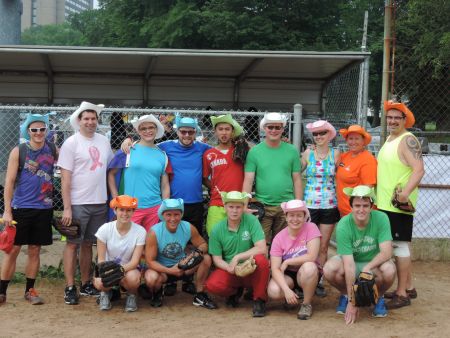With Halifax rolling out the rainbow carpet for Pride this July, there has been no shortage of events celebrating the LGBTQ community on our city’s cultural landscape, from songwriters’ circles to panel discussions.
Perhaps underrepresented though, are stories from the LGBTQ sporting community, some of whom participated in last weekend’s Kick Off to Pride Co-ed softball tournament.
That’s something organizer Corey Oickle looks to change.
“For the most part I don’t think it’s advertised enough that we actually play competitively. It’s in the Pride guide and that’s more or less it, and it’s just listed as Friday, ECRSA [East Coast Rainbow Softball Association] presents Kick-off to Pride, with most people thinking it’s the Dykes and Divas game,” says Oickle.
The tournament, hosted by ECRSA, played host to six teams from around the HRM and is now drawing interest from outside the city and the LGBTQ community. This year marks the first time in the tournament’s four-year history that organizers were forced to turn away teams.
Oickle was surprised by the interest from outside the LGBTQ sporting community.
“The teams we turned away were all straight, and they knew it was for Pride. They just wanted to play…next year we’ll be expanding to two fields and adding games on Friday.”
Mary Ann Daye, softball player and sponsor of the CoHos, a competitive women's team, has seen first-hand how the league and its annual tournament have given many of those who may have felt self-conscious about their athletic ability an opportunity to get in the game.
“I’ve watched a lot of gay men who could’t catch a ball when they started, and after a few seasons I’ve seen these same guys grow into solid ball players because the league gave them a chance to play.”
Combatting the stereotypes held of LGBTQ athletes and creating sport development opportunities for younger athletes is the aim of the ECRSA and its partners. Daye is optimistic that these gains can be built upon, but warns against complacency.
“There’s still lots of challenges and obviously not everyone accepts us. Things have improved for many athletes and it’s becoming safer to be an out athlete in some sports, and my fear is younger players will forget the struggle.”
In addition to the ECRSA, Halifax is currently home to The Rainbow Halifax Off-Road Mountain Bike Users Society (RHOMBUS); a local sailing club called Women on Water; and a running group, The Halifax Front Runners; with the list of sports offered growing every year.
Notably, The Loose Ends, a curling club based out of the Mayflower rink, put Halifax on the LGBTQ sporting map last fall by hosting the Bluenose Bonspiel. With over 30 teams from across North America competing, the Bonspiel crowned the national champions of LGBTQ curling. The tournament garnered plenty of national media coverage, and a visit from Justin Trudeau.
The success of the Bluenose and other events like it augers well for future opportunities for these athletes to compete against the best their sport has to offer on a larger stage.
Internationally, the issue of LGBTQ athletes and examples of the discrimination they face continues to make headlines. From Russia's recent adoption of harsh new anti-gay laws in the lead-up to the Sochi Winter Olympics to the complex issue of transgender athletes in gendered sports.
These examples are further evidence of the challenges faced by athletes as well as governing bodies and highlight the importance of ongoing dialogue, education and political engagement in the fight for equality in the sporting world.
Here in Halifax, advocacy organizations like the Nova Scotia Rainbow Action Project (NSRAP) and the Gay/Straight Alliance’s Youth Project have been working to create further opportunities for younger LGBTQ athletes within the broader sporting community.
Kristen Sweeney, Outreach Coordinator at Halifax’s Youth Project views this as the next hurdle in creating opportunities for these youth in sport.
“We’re working with schools right now to create guidelines for trans youth around gym and recreation, creating safe environments for youth of all orientations. There’s a long way to go, but we’ve adapted our funding strategies to address the issue.”
Sweeney and the Youth Project have recently secured a grant to bring on a full-time recreation coordinator and to establish programs addressing the need to create safe spaces for all youth to pursue an active lifestyle.
“The plan is to do two summer camps: Camp Coyote for for transgender and genderqueer youth, and Camp Seahorse which is for all LGBT youth and their allies.”
Sweeney has already seen benefits of investing in these recreation programs, with the kids seizing the opportunities the camps provide.
“Many of our campers never felt comfortable playing sports in school, but they’ve said, at Coyote, they can play football or dodgeball and feel comfortable doing so. That’s why it’s important for us, the only LGBTQ youth organization in the province, to create these spaces.”
For more information on these programs and organizations in NS visit http://nsrap.ca or http://www.youthproject.ns.ca/index.php



